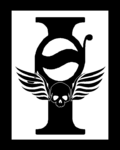Inquisition (Telstein)
The Holy Orders of the Emperor's Inquisition are a highly secretive paramilitary investigative body operating within the Imperial Telstein Sector, as in all space under the control of the God Emperor of Mankind. The Inquisition acts as a secret police force against threats too insidious or esoteric for Imperial Commanders or the conventional security forces of the Adeptae to defeat. Unlike many other Imperial bodies, the Inquisition is decentralised rather than rigidly hierarchical. Thoughtfulness, curiosity, analytical skill and creativity are all valued traits for the agents of the Inquisition - known as Inquisitors where in many other walks of life they can lead to trouble - even to a visit from an Inquisitor.
The decentralised nature of the Inquisition originates from the fact that each Inquisitor draws their authority directly from the Emperor himself, and that authority is notionally limitless. Each Inquisitor can requisition any force or assistance, require any information, judge any infraction, and pass any sanction in the pursuit of their mission. This immense authority and equally wide latitude in how to carry out their duties has resulted in the typical image of an Inquisitor being one of a capricious and merciless, roving executioner whose presence heralds death for the slightest of misdemeanors and apocalyptic destruction for the enemies of the Imperium and any who are remotely nearby to them. That is if one even believes they are real: so sensationally exaggerated is the image of the Inquisition in the minds of most of the Imperium's uninitiated masses, that many citizens believe them to be a bogeyman. In reality, however, the Inquisition has created its own internal bureaucracy and structure - though across the entire Imperium there were significant regional variations in administration - and the actions of its members are frequently scrutinised by their peers to guard against radicalism or treachery.
History
Organisation
Inquisitors belong to at least one - usually two or more 'Orders' of the Inquisition. The first will be the Local Conclave which oversees the Inquisition's operations within a given area of the Imperium. This Local Conclave will usually administer most of the shared resources of the Inquisition - fortresses, research facilities and libraries, as well as militant forces, administrative adepts, psychoconditioned menial serfs and other officials. The organisation of the Local Conclave is also the predominant vehicle for holding Inquisitors in the area to account, and for giving them direction toward particular threats.
Whilst the remit of an Inquisitor is universal and they must be able to turn their hand to combatting any enemy, the often niche and esoteric nature of their foes means that few Inquisitors can meaningfully become experts in all threats within the confines of a human lifetime. Therefore, in addition to the Local Conclave, all Inquisitors will belong to at least one of the many Disciplinary Orders indicating a specialism in understanding and combatting particular types of threats to the Imperium. There are three principal Disciplinary Orders dedicated to the largest threat-groups to the Imperium - the Alien, the Witch, mutant and heretic, and the Demon. The Orders Majoris of the Ordos Xenos, Ordos Hereticus, and Ordos Malleus each respectively specialise in those threats. Meanwhile there are a myriad of Orders Minoris which have more narrowly defined purviews, such as the Ordos Militarum that polices the Imperial Guard or the Ordos Scriptus which oversees the Librarium Terra on earth itself. It is not unheard of for Inquisitors to transition between Disciplinary Orders thoughout their careers - particularly if they give themselves and their life's work over to combatting a multidisciplinary threat like chaos-worshipping aliens.
In the Telstein Sector, the Local Conclave is known as the Ordos Telstein and its head is the Grand Master of the Ordos Telstein, currently Lord Inquisitor XX of the Ordos Malleus. The Ordos Telstein has a number of Inquisitorial Fortresses known to outsiders, such as the notional headquarters of the Order on Telstein itself - though its members also have access to covert facilities and resources spread across the entire Sector. This ranges from dedicated fleet squadrons and Stormtrooper Regiments through to mobile laboratories and purgation units to analyse and dispose of defeated foes. This is on top of the personal resources of individual Inquisitors which can range from a personal entourage of a handful of ill-equipped novice agents through to veritable armies of overt and covert resources operating from countless facilities and furnished with the finest of arms and armour.
Each of the three Orders Majoris are represented in the governance of the Ordos Telstein by their respective Masters:
- Lord Inquisitor XX, Master of the Ordos Malleus in the Telstein Sector
- Lord Inquisitor XX, Master of the Ordos Xenos in the Telstein Sector
- Lord Inquisitor XX, Master of the Ordos Hereticus in the Telstein Sector
In the Telstein Sector, the Grand Master is also assisted by the Vicariate Master of the Ordos Telstein, whose role is principally to act as the Grand Master's chief-of-staff. Presently Inquisitor XX of the Ordos Machinum, the Vicariate Master is principally concerned with the mundanity of managing the Local Conclave's resources, communications, and meetings. Whilst on paper this role presents little opportunity for leadership of other Inquisitors, its unparalleled access to sensitive information and the ear of the Grand Master means that it is a highly sought-after appointment for those seeking advancement within the Ordos Telstein.
Inquisitorial Cells
Doctrine
